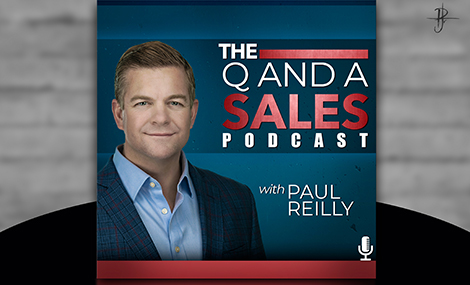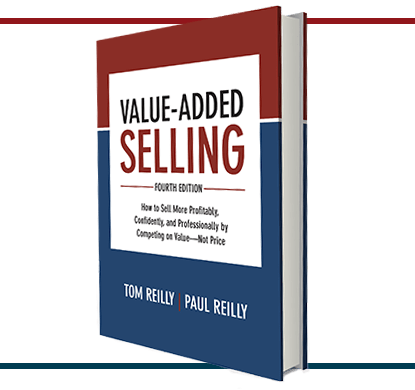Paul provides some insight into why sellers discount…and why they should not have that authority.
Show Notes
Salespeople discount because they can. They will discount to the parameters they are given. Do not let salespeople have discounting authority!
Salespeople fear losing the business. They forget how much power they have in a negotiation.
You don’t have to be the cheapest to win. Review your success stories.
Sellers need to be trained on how to sell value.
“Rather than thinking of ways you can discount, think of ways that you can create more value.”
Visit www.ToughTimer.com to get started on the 30-Day Tough-Timer Challenge!
Pre-order your copy of Selling Through Tough Times from Amazon or Barnes & Noble!
Click here to purchase the latest edition of Value-Added Selling!
Thanks to our production team at The Creative Impostor Studios! Click here to book a complimentary consultation with Strategist and Producer, Andrea Klunder, to find out how to launch, produce, and grow your company’s podcast.
***
Thank you for tuning in. Our show is updated weekly with the questions you ask. So, please go to the home page to ask the question that you want answered.
Be sure to follow our show in your favorite podcast app and share this episode with a colleague or friend.
And most importantly…make it a big day.
Why do sellers give discounts?
(Transcribed from podcast)
On today’s question, we’re going to talk about discounting. And what sparked this? Just the other day, making an investment in my business, and I gave this salesperson every buying signal you could imagine. It was clear that I was interested, but in order to sweeten the deal, they offered me a discount. It was only a 5% discount, but it made me think, why do salespeople discount? Why do they discount? So that’s what we’re going to focus on in today’s show. That’s the question we’re going to answer.
Before we get into that though, a quick shout-out to our sponsor. Andrea, over at The Creative Impostor Studios, does a wonderful job helping with this podcast. Anytime I’ve got a question or an idea, or I need support, I need help, whatever it may be, Andrea and her team are very responsive. So, if you’re thinking of starting a podcast, if you’re already got one and you just are looking to make a change, reach out to Andrea and her team. They can help with editing, producing, getting you started: all of the above. So reach out to Andrea and her team. We’ll have link over to her website on this episode’s webpage.
Also I have some great news. Selling Through Tough Times is almost here. November 2nd it’s going to be available. You can go to Amazon right now—you can pre-order your copy. You can also go to Chapters, Barnes & Noble, wherever you get your books, and you can pre-order that book. So it’s here for you. It is your guide for selling through tough times. It’s going to show you how to build mental resilience. And I guarantee you, by taking the 30-Day Tough-Timer Challenge, which is part of the book, you are going to be more successful as a result of it.
So let’s get back to that question: Why do sellers give discounts? I’m going to give you four ideas—four things to think about. If you’re a sales leader, business owner, a salesperson, please think about this. Think about this before you give that discount or before you authorize that discount.
So let’s get right to it. Number one. Why do sellers give discounts? Because they can. If you were a sales leader/business owner/sales manager listening to this podcast, if you want to eliminate most of your pricing issues, take away your salespeoples’ ability to discount. And don’t even give them parameters within which they can discount. I’ll give you an example as to why. I remember even, even a company I used to sell for—a company I used to sell for. We were allowed to discount up to 55% off of list price without getting managerial approval. Now guess what the most common discount percentage given was: 55%. The same way Parkinson said that “Work will expand to the time allotted,” salespeople will discount to the parameters that they are given. So, take away your salespeoples’ authority to discount. This is absolutely critical, because once you demonstrate to them that discounting is no longer an option, they’re going to get more creative in how they can sell value. Think about it. I think it was Caesar, when he went back to invade Rome, to take it back. When they crossed the river, I think it was the Rubicon River, he burned the bridge. He burned the bridge, letting his warriors know that retreat was not an option. They fought a little bit harder knowing that they weren’t going to be able to retreat.
Think about your salespeople. If you eliminate their ability to discount, how much harder are they going to sell value? So that’s, important. Number one, if you want to eliminate most of your pricing headaches, just stop giving your salespeople authority to discount.
Number two, something to think about why sellers discount, they fear losing the business. There are so many times where I’m interacting with salespeople, and they will tell me, “Yeah, but Paul, if I don’t discount, I’m going to lose the business. If I don’t discount and give my customer what they want, they’re going to go over to my competition.” And all of that, it stems from fear, their fear of losing the business.
What’s interesting—. I was talking to a decision maker who was in the procurement type of world. So they’re responsible for meeting with salespeople, issuing purchase orders, all that stuff. And this procurement manager, (that’s what I’m going to call him), he told me, he’s like, “It’s interesting. Salespeople, they forget how much power they actually have.” And he shared an example. He’s like, “I was negotiating with a salesperson who came into my office,” and all he had to do is tell the salesperson, “’Look, we really need you to sharpen your pencil on this year’s proposal. You guys pushed through price increases last year. We really need you to give us some relief.’” And he said, “Just by saying that, just by applying that pressure, I could see that the salesperson was overcome with fear. But what they didn’t realize—what the salesperson and the manager didn’t realize—is that I was heavily vested in their business. The last thing I want to do is switch providers. The last thing I want to do is have to explain to all of my teammates that rely on me that we are switching and that’s going to create some headaches.” And he said, “You know, salespeople just forget that they have quite a bit of power when it comes to that negotiation, when they go in there and meet with the customer.”
So, rather than letting your fear control you, you need to control your fear. And one way to do that is to recite positive affirmations. I’m a big fan of positive affirmations. Go into a meeting with a customer and have more confidence by reminding yourself of all the ways that you helped sell the total value in the past. And here’s what I mean by that. Think about instances where your solution was higher priced, but you still won. Think about the action that you took that got you to that point. Think about how you felt going into that negotiation/into that meeting. The key here is to remind yourself that you don’t have to be the cheapest. You truly don’t have to be the cheapest to win. Go back and review success stories where you were able to sell at higher prices.
Number three: Why do sellers give discounts? Because they lack the skill to sell on total value. It’s amazing how often salespeople are expected to sell value, yet they have not been trained on how to sell value. They don’t have a process in place. They don’t know how to proactively take control of the sales conversation and guide it down a path of value. They don’t know that they need to talk to multiple decision makers. They don’t know how to differentiate their alternative. They don’t know how to present their solution in a compelling way to emphasize value and take the focus off of price. So, lack of skill is one of the major reasons why sellers fail to hold the line.
So, what I would encourage you to do is, obviously, subscribe to the podcast. Keep listening to some of these tips and ideas. But pick up your copy of Value-Added Selling. Value-Added Selling is your go-to guide. It’s going to help you and explain the process of how to proactively take control of that conversation and guide it down a path of value.
Now, the final thing we’ll talk about today—why do sellers give discounts? We call this Stockholm Syndrome. Stockholm Syndrome is where the seller relates more to the buyer than they do their own company. And this will manifest as salespeople tell me, “Well, I gave the customer a discount because, you know, they’re a good customer. I have a good relationship with them, and they really need that discount. They really need it. I don’t want to disappoint them. I want to give them the discount.”
Your customers don’t want a discount. What they want is better value. They want you to generate greater outcomes. They want you to solve their problems. They want you to help them become more successful. And what happens with Stockholm Syndrome is, salespeople that are not creating enough value, they almost feel guilty. They relate more to the buyer and tell themselves, “You know what? Maybe they do deserve a discount.” They don’t deserve a discount, they deserve more value. So rather than thinking of ways that you can discount, think of ways that you can create more value: How can you make their life easier? How can you help them achieve their greater organizational objectives? So make sure that you’re focusing your attention, not on the discounts you can give, but on the value that you can create.
Make it a big day.


